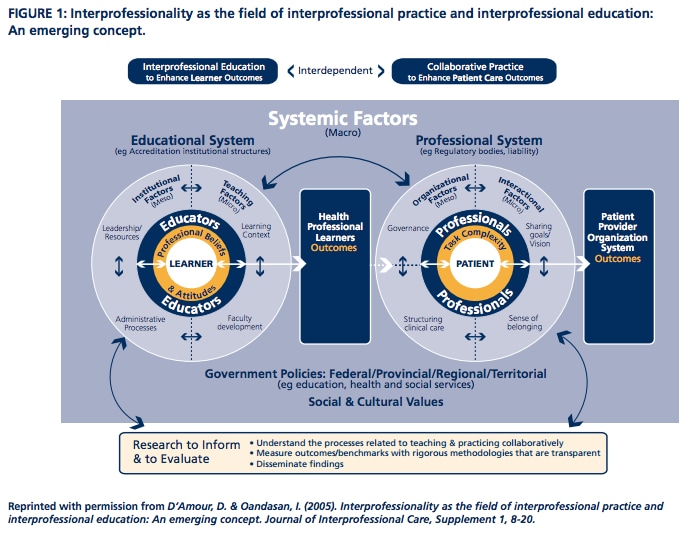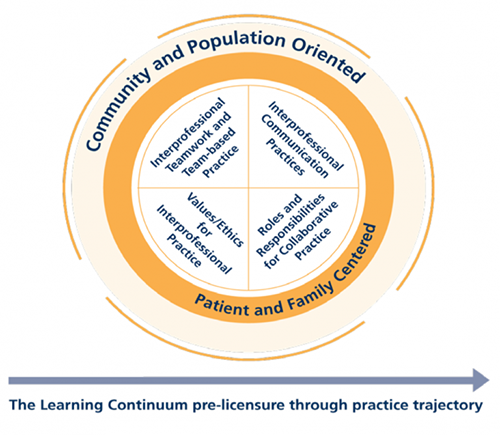What Is Interprofessional Education and Collaborative Practice?
What is IPE?
Interprofessional education (IPE) occurs when students from two or more professions learn about, from, and with each other to enable effective collaboration and improve health.
-World Health Organization Framework for Action on
Interprofessional Education and Collaborative Practice, 2010
What is IPC/IPCP?
Interprofessional care/collaborative practice occurs when multiple health workers from different professional backgrounds work together with patients, families, [careers], and communities to deliver the highest quality of care.
-World Health Organization Framework for Action on
Interprofessional Education and Collaborative Practice, 2010
Learn more through the National Interprofessional Competency Framework Quick Reference Guide.
The National Interprofessional Competency Framework Quick Reference Guide was created by the Canadian Interprofessional Health Collaborative, a national hub in Canada for interprofessional education and collaborative patient-centered care. This is one of several frameworks used internationally to guide IPE initiatives. Additional IPE frameworks can be found in the Getting Started with IPE section, including the IPEC Core Competency framework most commonly used in the U.S.

Getting Started With IPE
The best way to get started with IPE is to understand the framework.
Build foundational knowledge
The most commonly used framework for IPE in the U.S. is the Interprofessional Education Collaborative’s (IPEC) Core Competencies. Originally created in 2011 by six professional and accrediting bodies, the IPEC expert panel now has representation from 15 different health care professions including nursing, medicine, osteopathic medicine, pharmacy, occupational and physical therapy, social work, dentistry, and public health. IPEC is inspired by a vision of interprofessional collaborative practice as the key to the safe, high quality, accessible, and patient-centered care.
IPE core competencies and frameworks
- Competency 1: Work with individuals of other professions to maintain a climate of mutual respect and shared values. (Values/Ethics for Interprofessional Practice)
- Competency 2: Use the knowledge of one’s own role and those of other professions to appropriately assess and address the health care needs of patients and to promote and advance health of populations. (Roles/Responsibilities)
- Competency 3: Communicate with patients, families, communities….(Interprofessional Communication)
- Competency 4: Apply relationship-building values and the principles of…(Teams and Teamwork)
The interprofessional collaboration competency domain

Source: Interprofessional Education Collaborative. (2016). Core competencies for interprofessional collaborative practice: 2016 update. Washington, DC: Interprofessional Education Collaborative.
Questions to consider before developing IPE activities
- What is the overall goal of this project/initiative at the interprofessional and profession-specific levels?
- What are the external/internal drivers influencing development of this project/initiative?
- Who are your potential partners/stakeholders?
- Who will this project/initiative affect/impact?
- Who are the key players in designing, implementing and evaluating this project/initiative and how will they work together
- What are the specific objectives of this project/initiative?
- Content
- Essential elements of collaboration
- What methods and tools will you use to operationalize these objectives?
- What is already present in the system to build upon?
- How is the system aligned with the project/initiative in considering its smooth implementation?
- How will you evaluate your project/initiative?How will you ensure the sustainability of this project/initiative?
Find a mentor/IPE champion
Connect with any one of these mentors.